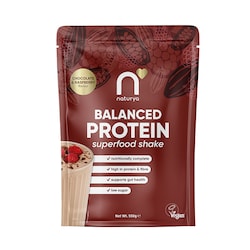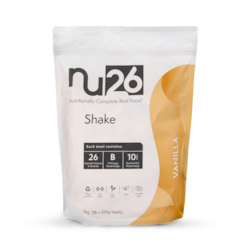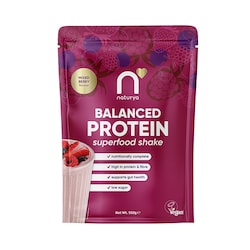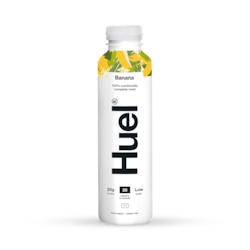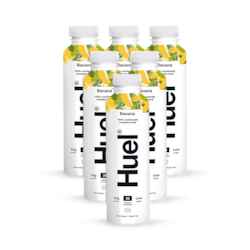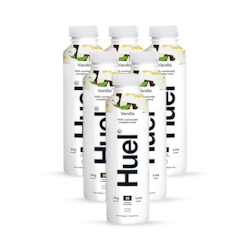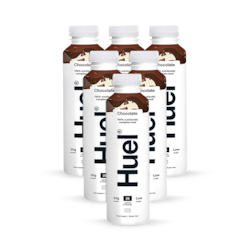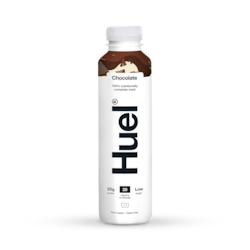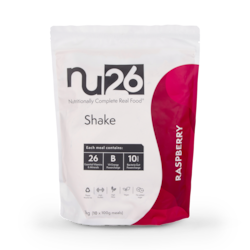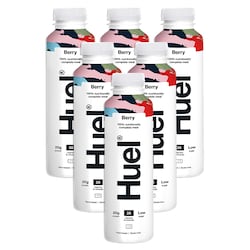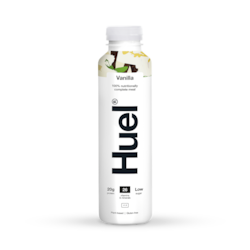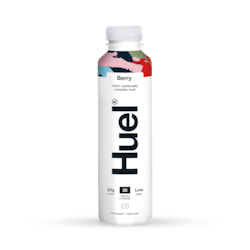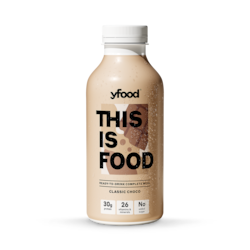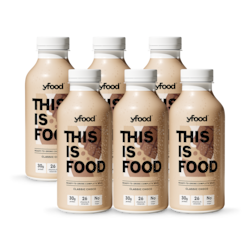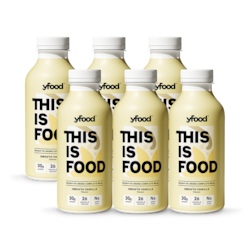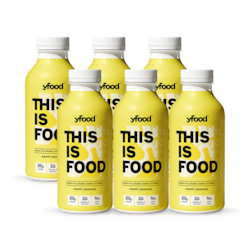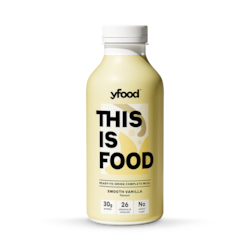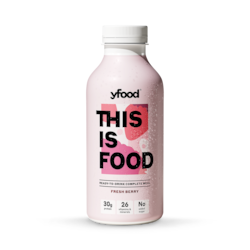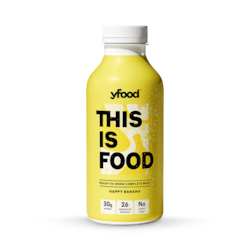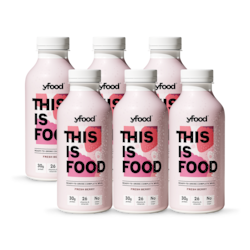20% off £30
Code:QUICK
10 low-calorie foods that will actually keep you feeling full

Tired of feeling hungry all the time, but want to be mindful of what you eat? We’ve got you covered. Stay satisfied, with these low-calorie, filling foods…
Summary
1What foods are filling but low in calories?
10 foods that are low calorie but that will fill you up include lean meats, eggs, Greek yoghurt, vegetables...
2What are low-calorie snacks?
Looking for low-calorie snacks? Try a piece of fresh fruit, a handful of nuts or seeds, veggie sticks with hummus...
3How many calories do you need in a day?
The NHS states that the average man should aim for 2,500kcal and the average woman 2,000kcal per day…
It’s natural to think that eating fewer calories means feeling less satisfied, but that’s not always the case. Whatever your reason for choosing lower-calorie foods, there are plenty that can help you feel fuller for longer.
From protein-packed pulses to fibre-full fruits, eaten as part of a varied, balanced diet, these low-calorie foods and drinks can help you fill up stay on track with your goals.
10 easy low-calorie foods
Lean meats
Lean meats like poultry, beef and fish are lower in calories and they have a high protein content, with a low amount of fat. Their high, lean protein content can keep you feel fuller for longer as your body takes more time to digest it than it does other nutrients like carbohydrates.1
Try chicken, turkey, salmon, tuna and lean cuts of beef like sirloin steak. When cooking, opt for grilling, baking or poaching lean meats as this can help minimise adding extra calories to your meal.
Eggs
Like lean meats, eggs are low in fat, high in protein and low calorie. In fact, one whole large egg (about 50 grams) contains approximately 72 calories, six grams of protein and five grams of fat.2 Egg whites alone can be even lower in fat and calories too.3
Why not try whipping up some poached eggs for your breakfast or snacking on some boiled eggs for a protein-packed treat?
Greek yoghurt
Greek yoghurt is usually low in calories, thanks to its straining process. When traditional Greek yoghurt is strained, the whey (a watery liquid that contains lactose and carbohydrates) is removed, creating a thicker, creamier texture with a higher percentage of protein.4
100 grams of plain Greek yoghurt contains approximately 95 calories, with 8.8 grams of protein and 4.4 grams of fat.5 You can even find low fat options on the shelves too, which can have a lower number of calories than full fat Greek yoghurt.6
Greek yoghurt can be a great source of other nutrients too, especially calcium and probiotics.7 But it’s important to be mindful of added sugars and flavours, which can increase the calorie content.8 Instead, choose plain Greek yoghurt and add your own sweetener like honey or fruit – a delicious option for a filling, satisfying, high-protein breakfast.

Lentils and beans
Lentils and beans are high in fibre, an excellent source of vegan protein and low in calorie, making them a great staple to keep stocked in your kitchen cupboards.Fibre passes through your digestive system relatively unchanged, adding bulk to your stool and helping you feel satisfied.9
Tofu and tempeh
Tofu or tempeh are fantastic vegan, plant-based protein sources made from soybeans. Low in fat and low in calories too, both are excellent to add to recipes for a protein punch.
Tofu is made by pressing soybean curds into blocks.10 It’s typically very low in calories, with about 94 calories per 100 grams.11 However, the calorie content can vary depending on the type of tofu (silken, firm, extra-firm) and any added ingredients.
Tempeh is made slightly differently, by fermenting soybeans with a mould culture.12 It has a slightly firmer texture than tofu and is often considered to have a nuttier flavour. Tempeh typically contains around 167 calories per 100 grams.13
Whole grains
Whole grains are a nutritional powerhouse that can help you feel full and satisfied whilst having a lower calorie count. Packed with fibre, they slow down digestion, preventing you from feeling hungry as quickly.14 Unlike refined grains, which have been stripped of their nutrients, whole grains are rich in vitamins, minerals, and antioxidants.15,16
Some delicious whole grains include wholewheat bread and pasta, oats, quinoa, barley, millet and even popcorn.
Vegetables
Vegetables are more than just a tasty side dish; they're the unsung heroes of a healthy diet. Packed with fibre, vitamins, minerals, and antioxidants, they're nutrient-dense helping you feel full and satisfied throughout the day.17
Different vegetables have different nutritional benefits – some make great plant-based protein sources, whilst others are full of fibre or water. So, pile your plate with colourful, fibre packed vegetables like broccoli, spinach, carrots and Brussel sprouts.
Fruits
Not just a tasty treat, fruits are nutritional powerhouses. Full of fibre, vitamins, minerals and antioxidants, they’re a low-calorie option that's perfect for snacking or incorporating into your meals.17

Plus, their high-water content helps you stay hydrated and full, while their natural sweetness satisfies your cravings without any added sugars or preservatives.18,19
Next time you're looking for a healthy and delicious way to stay full, reach for a piece of fruit – why not try slicing up and apple or tucking into a bowl of berries with some chocolate spread on the side?
Nuts and seeds
You might think nuts and seeds are quite high in calories, but they can actually be a healthy and satisfying addition to your diet when consumed in moderation.
Nuts and seeds are packed with essential nutrients, like healthy fats, fibre, protein, vitamins and minerals.20 Their high fibre content can help you feel fuller and more satisfied throughout the day, whilst their healthy fats, vitamins and minerals content can contribute to your overall wellbeing.8
A small handful of nuts and seeds can be a great mid-afternoon snack or a delicious addition to some recipes. So, why not munch on a handful of almonds or sprinkle some hemp seeds on top of your salad?
Soups
There's something undeniably comforting about a steaming bowl of soup. But did you know that soups are not only delicious but also low in calories?
Soups have a high-water content, which helps you feel hydrated and satiated.21 They often contain vegetables, lean meats, and whole grains, which are rich in fibre and help you stay feeling full for longer.
The calorie content of soups varies depending on the type you choose, but most soups are relatively low in calories. However, be sure to check the label, as some can be high in sodium.
Low calorie snacks
Whether your hunger hits in the middle of the afternoon, or you need something to see you through to lunchtime, craving a snack is part of many of our day-to-day lives.
Here are seven delicious, low-calorie snacks to satisfy your cravings:

- fresh fruit
- vegetable sticks with hummus
- plain popcorn
- hard-boiled eggs
- Greek yogurt with berries
- nuts and seeds
- rice cakes
How many calories do you need a day?
The NHS states that the recommended daily calorie intake for the average person is 2,500kcal for men and 2,000kcal for women.22 However, the number of calories you need to consume every day can be different based on your age, weight, height and how much exercise you do.23
Your body needs calories to create energy and keep your body working as it should, so it is important that you eat enough to keep your body healthy. If you’re unsure how much you should be eating each day, we recommend speaking to a registered nutritionist or dietician.
Seven tips for staying full and satisfied
- Eat slowly and mindfully: take the time to eat and savour each bite, focusing solely on your food24
- Drink plenty of water: sometimes thirst can be mistaken for hunger, so make sure you stay hydrated25,26
- Choose healthy fats: avocado, olive oil, nuts and seeds can help you feel more satisfied and support your body in absorbing nutrients27,28
- Limit foods high in fat, salt and sugar (HFSS): these often contain unhealthy fats, sugars and sodium which can trick you into feeling full at first, but then hungry later29
- Plan your meals: prepare your meals in advance to help you make healthier choices
- Listen to your body: pay attention to your hunger cues and try to eat when you’re truly hungry and stop when you feel full
- Volume eating: also known as the volumetrics diet, volume eating includes focusing on adding a large volume of low-calorie, nutrient-dense foods to your meals.30,31 Try adding a side salad or packing your plate with lots of veggies
The final say
The more you start to look, the more you’ll start to see there’s plenty of food and drink that are low in calories, and that it’s easier than you may initially think to add them to your diet. Take a look at our selection of tasty recipes for some inspo.
Just be sure to incorporate low-calorie foods as part of a varied, balanced diet that fuels your body, mind and overall well-being. Speak to your GP if you’re not sure how much you should be eating for your specific needs as they’ll be able to give you tailored advice and tips.
This article provides informational advice and is not a substitute for medical care. Curated by experts for accuracy, we take great care to ensure the information is up-to-date and relevant. However, you should always consult your GP or healthcare professional before using supplements or alternative products, particularly if you have medical conditions or are under supervision.
1. British Nutrition Foundation. Eat more, lose weight [Internet] nutrition.org.uk 2022 [cited 2024 Nov 29]. Available from: https://www.nutrition.org.uk/media/vvondfra/energy-density-leaflet-april-2022.pdf
2. FoodData Central [Internet]. Usda.gov. 2024 [cited 2024 Oct 9]. Available from: https://fdc.nal.usda.gov/fdc-app.html#/food-details/748967/nutrients
3. FoodData Central [Internet]. Usda.gov. 2024 [cited 2024 Oct 9]. Available from: https://fdc.nal.usda.gov/fdc-app.html#/food-details/747997/nutrients
4. Merriam-Webster Dictionary [Internet]. Merriam-webster.com. 2024 [cited 2024 Oct 9]. Available from: https://www.merriam-webster.com/dictionary/whey
5. FoodData Central [Internet]. Usda.gov. 2024 [cited 2024 Oct 9]. Available from: https://fdc.nal.usda.gov/fdc-app.html#/food-details/2259794/nutrients
6. FoodData Central [Internet]. Usda.gov. 2024 [cited 2024 Oct 9]. Available from: https://fdc.nal.usda.gov/fdc-app.html#/food-details/330137/nutrients
7. Fisberg M, Machado R. History of yogurt and current patterns of consumption. Nutrition Reviews [Internet]. 2015 Jul 14 [cited 2024 Oct 9];73(suppl 1):4–7. Available from: https://pubmed.ncbi.nlm.nih.gov/26175483/
8. Added Sugars [Internet]. www.heart.org. 2021 [cited 2024 Oct 9]. Available from: https://www.heart.org/en/healthy-living/healthy-eating/eat-smart/sugar/added-sugars
9. NHS website. How to get more fibre into your diet [Internet]. nhs.uk. 2022 [cited 2024 Oct 22]. Available from: https://www.nhs.uk/live-well/eat-well/digestive-health/how-to-get-more-fibre-into-your-diet/
10. Zheng L, Regenstein JM, Teng F, Li Y. Tofu products: A review of their raw materials, processing conditions, and packaging. Comprehensive Reviews in Food Science and Food Safety [Internet]. 2020 Oct 3 [cited 2024 Oct 22];19(6):3683–714. Available from: https://ift.onlinelibrary.wiley.com/doi/abs/10.1111/1541-4337.12640
11. FoodData Central [Internet]. Usda.gov. 2024 [cited 2024 Oct 22]. Available from: https://fdc.nal.usda.gov/fdc-app.html#/food-details/411177/nutrients
12. Teoh SQ, Chin NL, Chong CW, Adiratna Mat Ripen, Muhammad, Jen J. A review on health benefits and processing of tempeh with outlines on its functional microbes. Future Foods [Internet]. 2024 Mar 1 [cited 2024 Oct 22];100330–0. Available from: https://www.sciencedirect.com/science/article/pii/S2666833524000364
13. FoodData Central [Internet]. Usda.gov. 2024 [cited 2024 Oct 22]. Available from: https://fdc.nal.usda.gov/fdc-app.html#/food-details/365644/nutrients
14. Nirmala Prasadi V. P, Joye IJ. Dietary Fibre from Whole Grains and Their Benefits on Metabolic Health. Nutrients [Internet]. 2020 Oct 5 [cited 2024 Oct 22];12(10):3045–5. Available from: https://www.mdpi.com/2072-6643/12/10/3045
15. Papanikolaou Y, Slavin JL, Clemens R, Brenna JT, Hayes D, Gaesser GA, et al. Do Refined Grains Have a Place in a Healthy Dietary Pattern: Perspectives from an Expert Panel Consensus Meeting. Current Developments in Nutrition [Internet]. 2020 Oct [cited 2024 Oct 22];4(10):nzaa125. Available from: https://pmc.ncbi.nlm.nih.gov/articles/PMC7538308/
16. Călinoiu LF, Vodnar DC. Whole Grains and Phenolic Acids: A Review on Bioactivity, Functionality, Health Benefits and Bioavailability. Nutrients [Internet]. 2018 Nov 1 [cited 2024 Oct 22];10(11):1615–5. Available from: https://pmc.ncbi.nlm.nih.gov/articles/PMC6265897/
17. Sanders LM, Zhu Y, Wilcox ML, Koecher K, Maki KC. Effects of Whole Grain Intake, Compared with Refined Grain, on Appetite and Energy Intake: A Systematic Review and Meta-Analysis. Advances in Nutrition [Internet]. 2021 Jul [cited 2024 Oct 22];12(4):1177–95. Available from: https://pmc.ncbi.nlm.nih.gov/articles/PMC8321865/
18. NHS Website. Why 5 A Day? [Internet]. nhs.uk. 2022 [cited 2024 Oct 22]. Available from: https://www.nhs.uk/live-well/eat-well/5-a-day/why-5-a-day/
19. Montenegro-Bethancourt G, Johner SA, Remer T. Contribution of fruit and vegetable intake to hydration status in schoolchildren. American Journal of Clinical Nutrition [Internet]. 2013 Aug 22 [cited 2024 Oct 22];98(4):1103–12. Available from: https://www.sciencedirect.com/science/article/pii/S0002916523052772
20. Nutrient analysis survey of fresh and processed fruit and vegetables with respect to fibre Analytical report [Internet]. [cited 2024 Oct 22]. Available from: https://assets.publishing.service.gov.uk/media/5a82a9baed915d74e6237000/fruit_and_vegetable_survey_2015_analytical_report.pdf
21. Nutritional information nuts and seeds [Internet]. Nutritiontable.com. Nutritions; 2024 [cited 2024 Oct 22]. Available from: https://www.nutritiontable.com/nutritions/?c=12
22. Hydration Information - British Nutrition Foundation [Internet]. British Nutrition Foundation. 2015 [cited 2024 Oct 22]. Available from: https://www.nutrition.org.uk/nutritional-information/hydration/
23. NHS website. Calorie counting - Better Health [Internet]. nhs.uk. 2022 [cited 2024 Oct 22]. Available from: https://www.nhs.uk/better-health/lose-weight/calorie-counting/
24. NHS website. Understanding calories [Internet]. nhs.uk. 2021 [cited 2024 Oct 22]. Available from: https://www.nhs.uk/live-well/healthy-weight/managing-your-weight/understanding-calories/
25. Nelson JB. Mindful Eating: The Art of Presence While You Eat. Diabetes Spectrum [Internet]. 2017 Aug 1 [cited 2024 Oct 22];30(3):171–4. Available from: https://pmc.ncbi.nlm.nih.gov/articles/PMC5556586/
26. Ashok V, Joshi AS. Effect of excessive water intake on body weight, body mass index, body fat, and appetite of overweight female participants. Journal of Natural Science Biology and Medicine [Internet]. 2014 Jan 1 [cited 2024 Oct 22];5(2):340–0. Available from: https://pmc.ncbi.nlm.nih.gov/articles/PMC4121911/
27. McKay NJ, Belous IV, Temple JL. Increasing water intake influences hunger and food preference, but does not reliably suppress energy intake in adults. Physiology & Behavior [Internet]. 2018 Apr 17 [cited 2024 Oct 22];194:15–22. Available from: https://pubmed.ncbi.nlm.nih.gov/29678599/
28. Liu AG, Ford NA, Hu FB, Zelman KM, Mozaffarian D, Kris-Etherton PM. A healthy approach to dietary fats: understanding the science and taking action to reduce consumer confusion. Nutrition Journal [Internet]. 2017 Aug 30 [cited 2024 Oct 22];16(1). Available from: https://pmc.ncbi.nlm.nih.gov/articles/PMC5577766/
29. NHS Website. Facts about fat [Internet]. nhs.uk. 2022 [cited 2024 Oct 22]. Available from: https://www.nhs.uk/live-well/eat-well/food-types/different-fats-nutrition/
30. Hall KD, Ayuketah A, Brychta R, Cai H, Cassimatis T, Chen KY, et al. Ultra-Processed Diets Cause Excess Calorie Intake and Weight Gain: An Inpatient Randomized Controlled Trial of Ad Libitum Food Intake. Cell Metabolism [Internet]. 2019 Jul [cited 2024 Oct 22];30(1):67-77.e3. Available from: https://www.cell.com/cell-metabolism/fulltext/S1550-4131(19)30248-7
31. Rolls BJ. Dietary energy density: Applying behavioural science to weight management. Nutrition Bulletin [Internet]. 2017 Aug 15 [cited 2024 Oct 22];42(3):246–53. Available from: https://pmc.ncbi.nlm.nih.gov/articles/PMC5687574/
32. Rouhani MH, Fahimeh Haghighatdoost, Surkan PJ, Azadbakht L. Associations between dietary energy density and obesity: A systematic review and meta-analysis of observational studies. Nutrition [Internet]. 2016 Apr 1 [cited 2024 Oct 22];32(10):1037–47. Available from: https://pubmed.ncbi.nlm.nih.gov/27238958/



